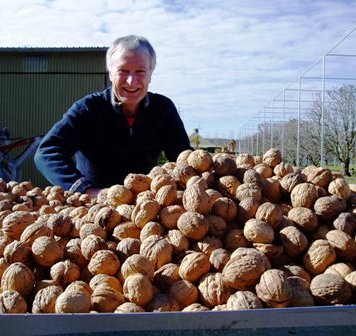
Andrew Whittaker: clearly nuts
Melbourne: the main event
With the bushfires now out and Melbourne moving into autumn, Andrew Whittaker brings us up to date with events in Australia.

Andrew Whittaker: clearly nuts
As a tourism destination, Melbourne has recognised that it cannot compete with Sydney, with its iconic Opera House, Harbour Bridge and surf beaches, so it has taken the path of attracting and conducting events to bring the tourists in and generate economic activity. So, as this is the time of more stable, milder weather and ideal for events both indoor and outdoor, Melbourne is currently inundated with events and the most popular leisure activity is ‘attending an event’. These include: the Melbourne Food and Wine Festival, the Melbourne International Comedy Festival, the Melbourne International Flower and Garden Show, the Melbourne Queer Film Festival, the L’oreal Melbourne Fashion Festival, and the Melbourne Festival of (horse) Racing .
All these are big international events in their own right yet notice that ‘Melbourne’ has to be in the title. This is not only to ensure correct branding and positioning (so that tourists come to the right place) but also so that the event can show it generated significant economic benefits to the city.
All this is before we consider the major sporting events that happen in March. The big daddy of all annual economic losers is the Australian F1 Grand Prix. This is conducted in one of Melbourne’s major public parks (Albert Park), which is taken over by the Grand Prix Corporation and closed to the public while the grandstands, pits and circuit are constructed and then taken down afterwards. Public access and use are denied during this period. It is estimated that the Victorian Government paid A$47 million just for the rights to host the race but the precise fee is a closely guarded secret as it would be a major embarrassment to the government. Overall the F1 race is estimated to lose A$40 million, a public subsidy that is justified because it is supposed to generate about A$90 million in economic benefits and activity. However, sponsors have dropped out and ticket sales were slow, so what is the justification?
It is also football transition time. There are four forms of football in Australia: summer football (soccer), which has just finished, then the winter football of Aussie Rules, rugby union and rugby league. These all have a big launch of their seasons which brings out the crowds for the first games of the year. Football is crucial for the economic viability of the main stadiums in each capital city. The Melbourne Cricket Ground (MCG) does not make its money from cricket but more from the regular weekly Aussie Rules games throughout the winter, with the odd union or league game thrown in when big crowds are anticipated.
Another major event is taking place at Scarborough near Perth in Western Australia. It is the Australian Surf Life Saving Championships, which involves over 6,000 competitors and officials. It is a massive event with a big television and spectator appeal. This is another event that is justified on economic grounds. It gets significant support from the Western Australia government and is used to promote the state and its tourism opportunities. This is its last year in Western Australia as the event moves back to the east coast next year after a recent tendering process to see who is willing to pay for the event and the infrastructure that goes with it.
An interesting issue is starting to develop in rugby union. Matt Denning, the Australian prop forward, is considering legal action against the Australian Rugby Union (ARU) for the serious injury he sustained in an ‘unsafe workplace’, ie the playing surface at Wembley! The injury cost him his Wallaby spot and the entire Super 14 season, meaning he is now in a poor negotiating position for a new contract. It is claimed that the Wembley surface was unfit for rugby as it was unstable for scrums, although suitable for football. A scrum collapsed and he tore his achilles tendon but the ARU had signed off the surface as suitable for rugby even though many players indicated it was potentially dangerous.
Andrew Whittaker has recently retired as chief executive of Aquatics and Recreation Victoria and is still active in the Australian sport and leisure sector.
The Leisure Review, April 2009
© Copyright of all material on this site is retained by The Leisure Review or the individual contributors where stated. Contact The Leisure Review for details.